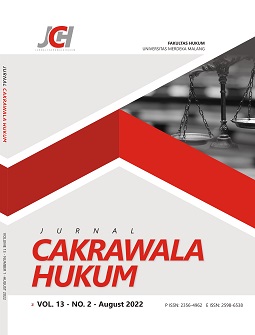Analysis of used clothing business competition with predatory pricing in the local clothing industry
DOI:
https://doi.org/10.26905/idjch.v13i3.8912Keywords:
Predatory Pricing, Used Clothing, Local Clothing Industry.Abstract
This research intends to examine juridically about used clothes that are offered with relatively cheap quality. This business is developing in Indonesia and can even kill the local clothing industry because the price difference is very large. This clothing business can weaken the local industry in the small and medium market, especially when local entrepreneurs want to improve the quality of their products so that they cannot compete with foreign products. Sales of used clothing due to low prices indicate competitive prices. The strategy of selling products at higher prices worries the Indonesian government because it can lead to unfair business practices. The approach is normative jurisprudence, namely the study of legal basis and standards. The results of this study indicate that the sale of used clothing is not part of predatory pricing practices. However, selling used clothing at relatively low prices reduces consumer interest in local products and can hurt the economy of the local clothing industry.
How to cite item:Â
Pritasari, M. (2022). Analysis of used clothing business competition with predatory pricing in the local clothing industry. Jurnal Cakrawala Hukum, 13(3), 291-299. DOI:https://doi.org/10.26905/idjch.v13i3.8912.
Downloads
References
Arifah, R. N., (2015). Kendala-Kendala Pencegahan Perdagangan Pakaian Bekas Impor di Kota Malang, De Jure, Jurnal Syariah dan Hukum, Volume 7 Nomor 1, Juni. DOI: https://doi.org/10.18860/j-fsh.v7i1.3513.
Biantara, D., Margaretha, V., & Lesmana, I. (2022). ANALISIS PERAN REGULATOR DAN ASPEK BIAYA DALAM PENCEGAHAN PRAKTIK PREDATORY PRICING DI E-COMMERCE INDONESIA. Indonesian Journal of Accounting and Governance ISSN, 2579, 7573. DOI: https://doi.org/10.36766/ijag.v6i1.270.
Dewi, N. M. I. K., Widiati, I. A. P., Sutama, I. N., (2020). Implikasi Penjualan Pakaian Bekas Impor Bagi Konsumen di Kota Denpasar. Jurnal Interpretasi Hukum, Vol. 1, No. 1 – Agustus - Hal. 216-221. DOI: https://doi.org/10.22225/juinhum.1.1.2222.216-221.
Diana, L. (2019). PERDAGANGAN PAKAIAN BEKAS IMPOR DI PEKANBARU, MENGAPA MASIH MARAK TERJADI?, Riau Law Journal, Vol 3, No 2 DOI: http://dx.doi.org/10.30652/rlj.v3i2.7817.
Hamidi, M. P., (2022). Tinjauan Green Economy dalam Hukum Persaingan Usaha di Indonesia, JURNAL PERSAINGAN USAHA, Vol. 3 (5), DOI: https://doi.org/10.55869/kppu.v3i-.42.
Katz, M., (2006). The Current State of Economics Underlying, Chicago: Antitrust Source.
McGee, J. S., (1980). Predatory Pricing Revisited, The Journal of Law and Economics, Volume 23, Number 2, Available online at: https://www.jstor.org/stable/i229082.
Prahmana, V. D., & Wiradiputra, D. (2022). Predatory Pricing Dalam E-Commerce Menurut Perspektif Hukum Persaingan Usaha. JISIP (Jurnal Ilmu Sosial dan Pendidikan), 6(3). DOI: http://dx.doi.org/10.58258/jisip.v6i3.3277.
Rachman, R., (2019). Penerapan Metode Ahp Untuk Menentukan Kualitas Pakaian Jadi Di Industri Garment, Jurnal Informatika 6(1):1-8, DOI: https://Doi.Org/10.31294/Ji.V6i1.4389. Available online at: https://www.ejournal.warmadewa.ac.id/index.php/juinhum.
Saida, F. N., (2011). Analisis Terjadinya Jual Rugi (Predatory Pricing) Menurut Hukum Persaingan Usaha, Skripsi. Surabaya: Universitas Airlangga. Available online at: http://lib.unair.ac.id.
Yanuar, M. A., (2022). Probabilitas Praktik Predatory Pricing pada Kegiatan Usaha dengan Menggunakan Hasil Kejahatan sebagai Modal Usaha, Jurnal Persaingan Usaha, Vol 3. DOI: https://doi.org/10.55869/kppu.v3i-.42.
Additional Files
Published
How to Cite
Issue
Section
License
Copyright (c) 2022 Jurnal Cakrawala Hukum

This work is licensed under a Creative Commons Attribution-ShareAlike 4.0 International License.
Authors who publish in this journal agree to the following terms:
The copyright of the received article shall be assigned to the journal as the publisher of the journal. The intended copyright includes the right to publish the article in various forms (including reprints). The journal maintains the publishing rights to the published articles. Authors must agree to the copyright transfer agreement by checking the Copyright Notice column at the initial stage when submitting the article.










